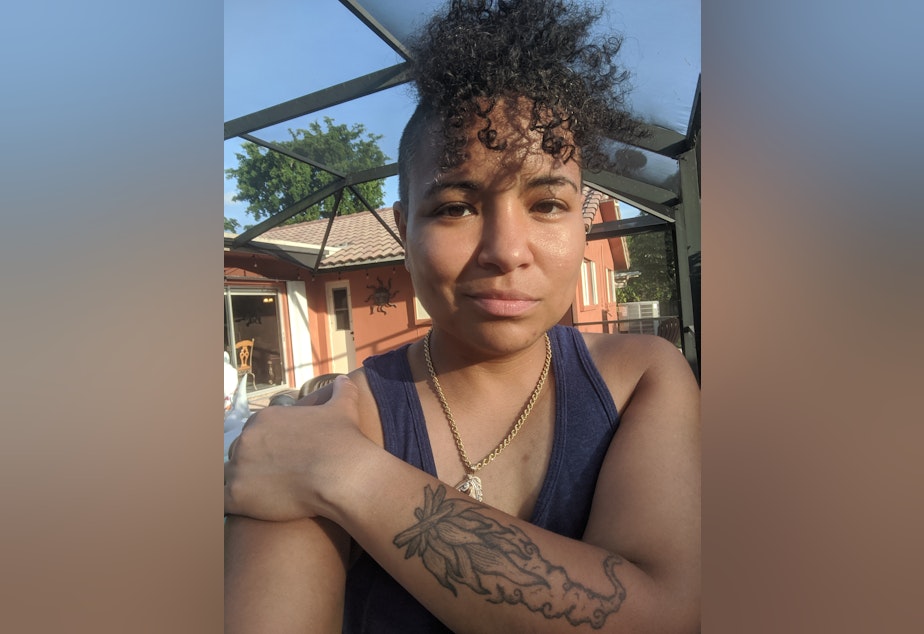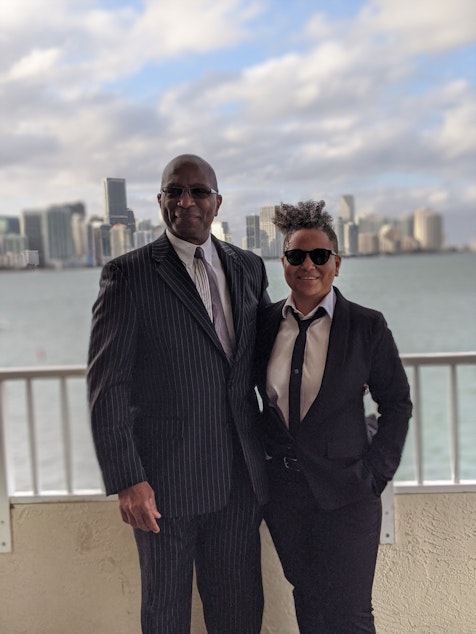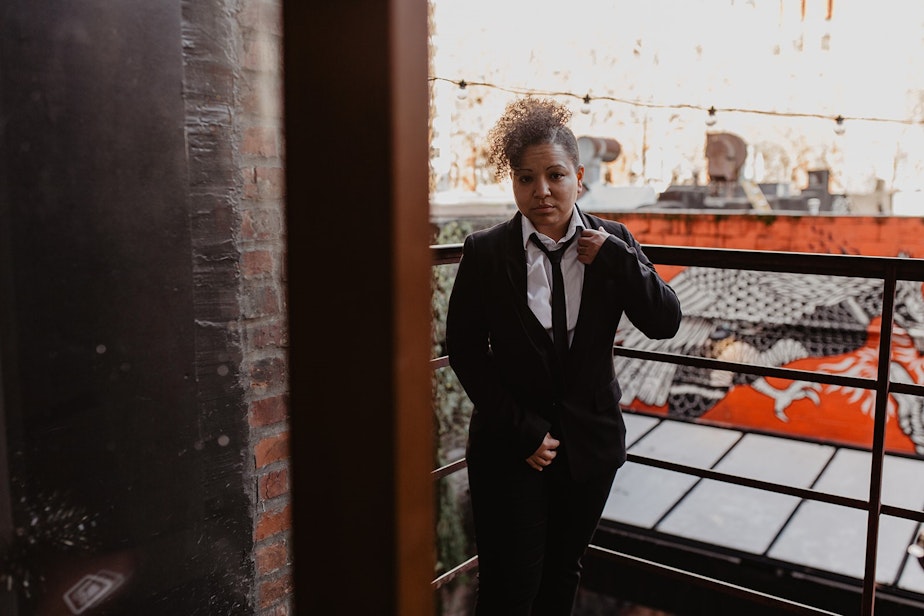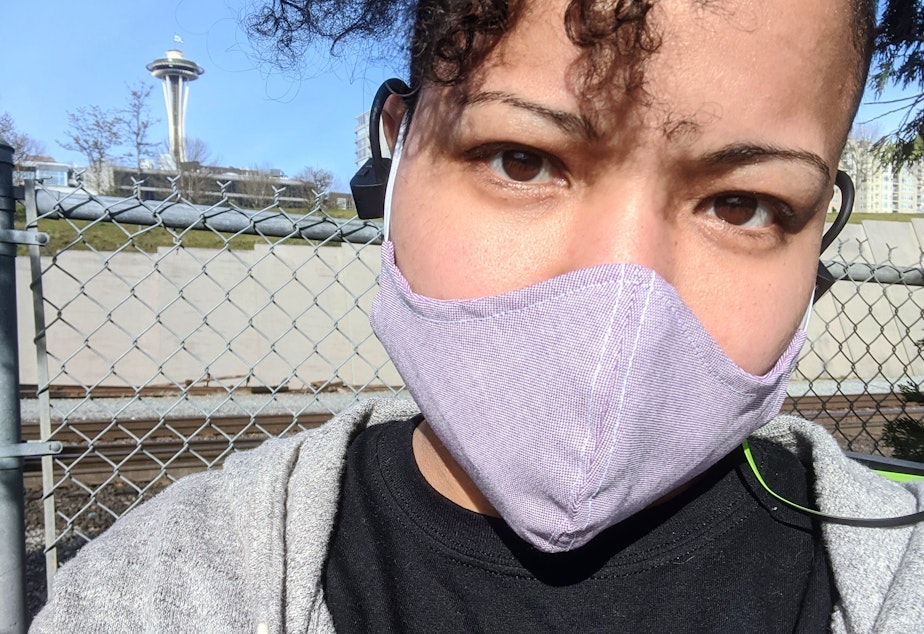Attention white people: Your #BLM memes are not enough

Biracial lesbian Mellina White has a few things to say to her good liberal white friends in Seattle.
This is an unsolicited letter to my white friends regarding Ahmaud, Christian, George, and the countless other black folks you will never hear about.
I'm black, white, and Hispanic. I grew up in Florida. I'm a lesbian. I also enjoy fancy cocktails and late-night live jazz.
I hate that I need to lead with my identities, but the state of our nation warrants it.
A few months ago, I ran an errand at Southcenter Mall. As I walked back to my car, a man in a pickup truck blocked my car and rolled down his window to get my attention. I looked at him and he yelled, "f---ing fa--ot," and drove off.
I shrugged my shoulders and got in my car. Why let him ruin my day? And also, it's not like I haven't heard that one before.
Sponsored
On numerous occasions, I have been called a fa--ot, dy-e, n---er, half-breed, and zebra by random strangers, so-called friends, and coworkers. I have gone to a fancy clothing shop and had the employee ask if I was shopping for a court date. I have gone to a car dealership to have a man refuse to give me a test drive. I have been randomly selected for additional screenings at the airport so many times that it is now part of my travel schedule.
I am a data person. I understand research shows that incidents like those involving Ahmaud Arbery, Breonna Taylor, and George Floyd are extremely rare. However, that is not the point. It's not the reason for the protests, exhaustion, or anger.

While I am fully aware that a bolt of lightning is more likely to take me out than the hands of a cop or vigilante neighbor, I also know that I walk through the world as a minority poster child because I’m an "other" in so many ways--black and Hispanic, lesbian and libertarian. I even grew up in a religious minority! I can't avoid this no matter how hard I try. I can't just be a person.
If you are disillusioned with the protests, the anger, the Black Lives Matter movement or are more concerned about looting than people, please know that the stories and people who make the news represent a tiny fraction of what all minorities face daily.
Sponsored
Modern-day racism has the face of Covid-19. It is silent and invisible, yet deadly. It is taxing on some communities and almost non-exist in others. If it doesn't impact your family, you might even suggest it's a hoax. But racism is very real. And it chips away at lives so slowly, our society doesn't take notice. Until now.
It's been a rough year. I know you mean well. But the fever pitch that we have reached compels me to share my thoughts with you on your online “activism.”
Over the past few weeks, I have seen countless memes, videos, and posts about race on your social media pages. Instructions on how we should educate ourselves. Endless explanations of white privilege. Book recommendations about race. Criticism of other white people who use phrases you perceive as oppressive. Images that simply say BLACK LIVES MATTER. The list goes on and on.
However, I can't help but notice some glaring omissions.
For instance, pictures of you hanging out with your friends of color. You out and about enjoying different cultures in real life. You actually physically connecting with human beings who are different than you regularly in your life. I never see those posts.
Sponsored
I know what you're thinking right now. You have black friends! You just don't parade them on your social media posts! And to be fair, I don't know your real life.
But seriously, do you actually have any black friends?
One of the catalysts for me writing this letter was sparked by navigating the social aftermath of the killing of Ahmaud Arbery. I witnessed many white people angry, frustrated, and hopeless while trapped in their homes, trying to make sense of yet another killing of a young black man.
I reached out to some, offering myself up as that POC friend to engage in an "uncomfortable conversation" that might help us all find answers and take meaningful action. The response from many was positive and supportive. But then, the conversation took a turn.
It wasn't long before I felt drowned out by white voices volunteering to help "facilitate" these uncomfortable conversations. What was the catch? The conversations had to be only through their methods for fear that I might be harmed otherwise.
Sponsored
Harmed? By a conversation? At that moment, I realized that while so many white people were coming from a place of sincerity, they ironically espoused the same viewpoints as the white southerners they often love to criticize.
I realized that many white progressives view people like me as marginalized, weak, and in need of protection simply because of my race. Without even knowing me or my life experience how could you ever reach that conclusion? Without actually picking up the phone and having a conversation with me, how could you know what I can handle?
I started to wonder how many of these white people dominating online conversations about equity actually had a real-life black friend.
And for the record, if we are going to generalize black people in such a broad sense, I would argue that African-Americans are the most resilient group in America. How could we not be after enduring hundreds of years of oppression? And if you don't believe me, have a conversation with a southern black auntie. She'll set you straight. If you don't know any, I've got a few I'd love to introduce you to. Make a friend.
Sponsored
I realized that a number of you, individuals with good intentions, actually perceive yourself as an authority on these issues because you read books by Robin DiAngelo (no offense, but she's white) or Shelly Tochluk (also white), or took a weekend course on "anti-racism" taught by a well-respected (and white) professor.
Pause for a moment and listen. Taking "action" is not sharing the same post everyone else in your echo chamber is sharing. It's getting out of your comfort zone and learning about people different than you in real life.
It even means listening with an open mind to people of color who may not align with your political views. These actions break down barriers and change our society for the better. I get it, we're in quarantine right now. You can't do anything in real life. But this behavior has been happening forever.
What you need to understand is that these issues cannot be taught in a classroom. How can you expect to participate in real human empathy without connection with an actual person who has had that personal experience?

When I was living in the Miami area in the early aughts, it was not easy being gay. A colleague of mine, whom I worked with daily, made it very clear she did not approve of homosexuals. Even though she was my age, we grew up in different cultures. I did not treat her any differently or try to change her mind about me. I was just Mellina. By the time my company sent me to Seattle, she and I were very good friends and she expressed how wrong she was before. She even began to bring other gay folks into her circle. Our personal relationship changed her heart for good. It's an understanding you'll never earn with a meme, book, or video. This is just one of the countless stories I can share from my life and I hope to have many more in the future.
Again, it all starts with friendship. But how do I find friends of color once Seattle reopens, you ask? Make an effort!
Show up to community events happening in your more diverse neighborhoods like Africatown and Columbia City.
Seek out dance parties like SLAY that give you the chance to engage with every minority in one night!
Think about how you earned all of those white friends you have and DO THE SAME EXACT THING to find POC friends. We're just people, too.
If all else fails, email me to go out for a drink. I will hang out with anyone for free cocktails.
I know what you're wondering. What if you show up to one of these events and you're the only white person there? Excellent! That is a feeling shared all too often by members of the African-American community. All it means is more people are likely to talk to you since you will stand out and you will make even more black friends. Score.
All kidding aside, while these actions may seem tiny, they deliver huge results. Results that will change your perspective about the black man birdwatching at the park or jogging in your neighborhood.
Use THIS moment as an opportunity to expand your circle. Real societal change starts with humans connecting and treating each other as individuals, not categories of identity.
Mellina White is the founder of The Seattle Conservative. In addition to politics, Mellina also writes about culture and LGBTQ style. She is a contributor to DapperQ, the popular queer style community, and in 2015 she made their Top 100 Most Stylish list. Mellina is a member of KUOW's Curiosity Club and has been a featured debater at two of KUOW's That's Debateable! programs. She lives in Seattle. If you'd like to take her up on her offer of a cocktail and a "courageous converstion," you can email her at themellinawhite@gmail.com. You can find her on Instagram at @mellinawhite.




